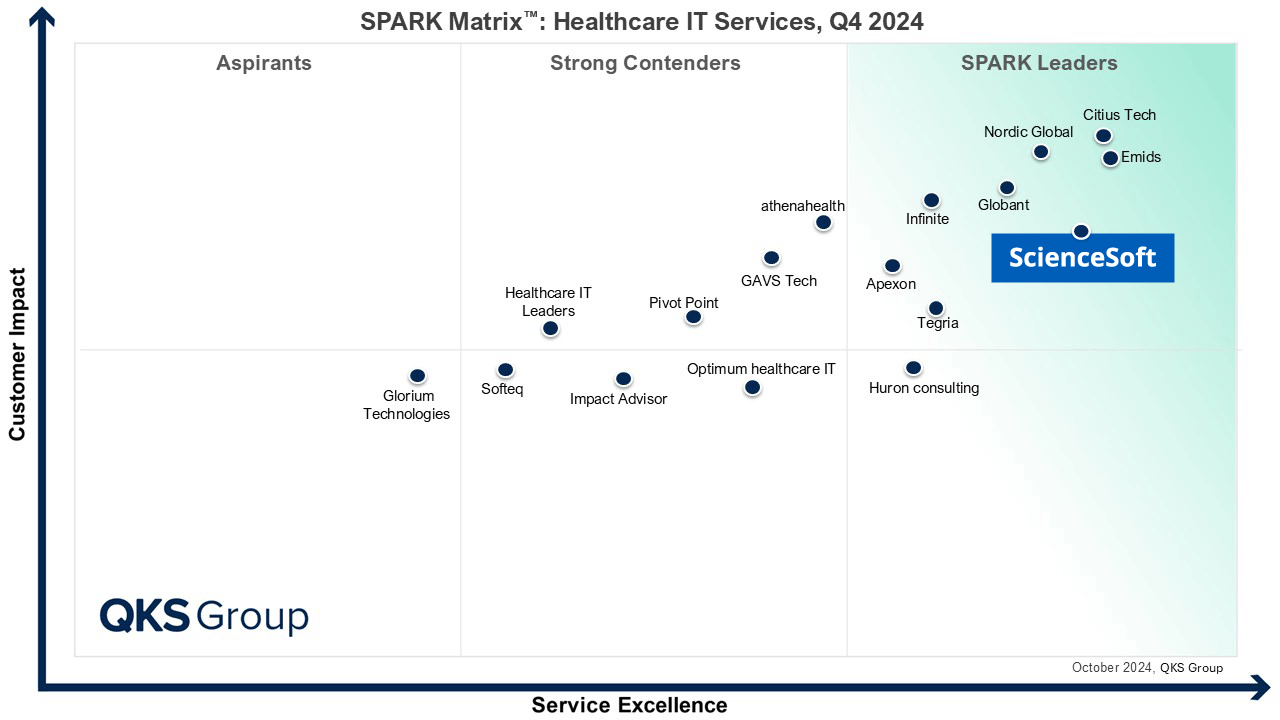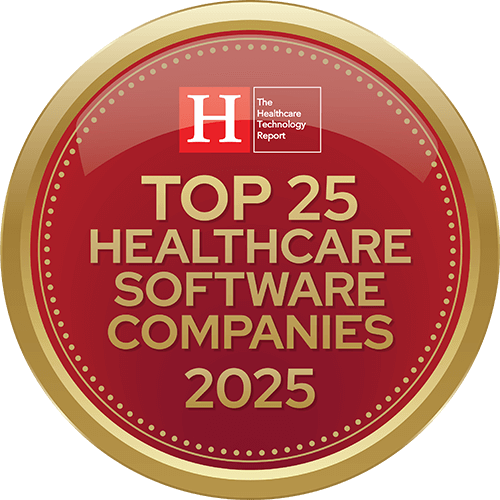EHR and EMR Software Development
ScienceSoft partners with healthcare providers and product companies to co-create secure and reliable EHR solutions that reduce admin burden and allow medical staff to focus on care.
Since 2005, ScienceSoft has been providing a full scope of EHR and EMR software development services to power secure PHI management and facilitate billing and treatment. Our team of healthcare IT experts with 5-20 years of experience guarantees high EHR usability, interoperability, compliance, and efficiency.
Meet ScienceSoft, a Reliable EHR Software Development Company
- Since 1989 in software development and since 2005 in healthcare IT.
- Working experience with healthcare standards (e.g., HL7, FHIR, ICD-10, CPT, XDS/XDS-I).
- ISO 27001, ISO 13485, and ISO 9001 certifications proving our dedication to data security, medical devices regulatory compliance, and quality management.
- Rich expertise in developing software compliant with HIPAA, GDPR, ONC, FDA, MDR, MACRA, MIPS, CEHRT, SAFER, NCPDP, and SAMHSA.
- Research-based UX/UI design focused on user convenience.
Our awards and partnerships

Featured among Healthcare IT Services Leaders in the 2022 and 2024 SPARK Matrix
Recognized for Healthcare Technology Leadership by Frost & Sullivan in 2023 and 2025
Named among America’s Fastest-Growing Companies by Financial Times, 4 years in a row

Top Healthcare IT Developer and Advisor by Black Book™ survey 2023
Recognized by Health Tech Newspaper awards for the third time (2022, 2023, 2025)

Named to The Healthcare Technology Report’s Top 25 Healthcare Software Companies of 2025
ISO 13485-certified quality management system
ISO 27001-certified security management system
3 Ways ScienceSoft Supports Your EHR Journey
EHR market entry consulting
We help you:
- Design an EHR feature set with a focus on care workflows.
- Plan high-level EHR architecture and a tech stack.
- Create a business case (featuring investments, ROI, etc.).
- Design user adoption strategy.
Full-cycle EHR software development
We handle together:
- EHR feature set design.
- Software architecture planning.
- UX/UI design.
- MVP development (with core EHR features), iterative improvements, and QA.
- Assistance with all relevant certifications.
EHR evolution
We work with you on:
- Analyzing your legacy EHR software and business needs.
- Designing new EHR features, requirements, advanced modules, etc.
- UI/UX redesign, code refactoring, and development.
- Compliance and security audits with further improvements.
Must-Have Functionality for Winning EHR Software
Whether you are building a new EHR from scratch or upgrading an old solution, ScienceSoft’s healthcare IT consultants and EHR developers are here to help you create a winning feature set.
The core feature set for EHR
|
|
|
Features to advance your EHR
When planning the features for your EHR software, security should be an underlying factor. I recommend paying attention to end-to-end PHI encryption, multi-factor authentication, and role-based access management.
These features don't only help guarantee PHI safety and avoid data theft scandals. They also contribute greatly to passing a HIPAA compliance audit and getting ONC certification (if you are targeting the US market) or passing local compliance procedures (if you are operating outside the US).
The Difference Between EHR for Practices and EHR for Hospitals
Even though having access to cohesive health and billing data is convenient, many doctors are frustrated with their EHRs’ unintuitive UI, lack of relevant features, and lengthy data entry processes. ScienceSoft’s consultants and EMR software developers suggest focusing on these aspects when designing an EHR for practices or hospitals:
EHR for medical practices
- A holistic medical history for each patient.
- Patient access to personal health records (e.g., via a patient app).
- Support for standard healthcare services like appointments, tests, prescriptions, etc.
- Built-in service coding and billing documentation assistance.
EHR for hospitals
- Instant data exchange between multiple hospital departments.
- Sharing of ADT data with patients’ medical practices.
- Extensive health records storage capacity.
- Support for a wide range of healthcare services (from consultations to surgeries).
Medical Specialties and Care Settings That Can Benefit from a Tailored EHR
Some physicians and care providers are less satisfied with off-the-shelf EHRs, particularly in specialties or care environments with unique workflows. Here’s a list of specialties and care settings where a custom or specialized EHR can make a significant difference in efficiency, patient care, and user experience.
Ophthalmology
Cardiology
Orthopedics
Dermatology
Otolaryngology
OB/GYN
Long-term care
6 Steps to Build an EHR System
EHR software development takes a team effort and comprises a discovery stage, project planning, UX and UI design, development and testing, pre-launch and post-launch activities.
1
Discovery stage
You get:
- A Business Associate Agreement (for HIPAA-covered entities).
- EHR market, target audience, and competitors research (for software product companies).
- Business needs and clinical workflow analysis (for healthcare organizations).
- Compliance requirements list (e.g., HIPAA, GDPR, ONC, CMS, FDA, MDR, local regulations).
- An EHR concept and marketing/implementation strategy.
- A business case with TCO and ROI.
2
EHR project planning
You get:
- A feature list and a software requirements specification (SRS).
- A comprehensive EHR design document (including architecture, integrations, and tech stack).
- Risk assessment and mitigation plans.
- A project plan with timeframes, key milestones, KPIs, and budget.
- EHR certification plan (e.g., ONC certification for US-targeted solutions).
3
UX and UI design
You get:
- EHR user scenarios for different roles within the healthcare organization.
- UX wireframes.
- UI prototypes.
4
Iterative development and testing
You get:
- Fully functional EHR front end, back end, and APIs for EHR integration.
- EHR quality report based on the results of functional, performance, security, compliance, compatibility, and accessibility testing.
5
Pre-launch
You get:
- Revised and updated documentation, risk assessment and mitigation plan.
- HIPAA risk assessment or GDPR compliance audit report.
- Help with submitting the EHR to an ONC-Authorized Testing Laboratory (for the US).
- For SaMD modules: help with premarket submission according to the FDA 510(k) program (US) or premarket certification by a Notified Body designated under MDR/IVDR (EU) or other authority according to local regulations.
- User training documentation.
6
EHR launch, support, maintenance, and evolution
You get:
- Data migration from the legacy records storage software to EHR (for healthcare organizations).
- EHR deployment to the production environment.
- A help desk and a maintenance team for your EHR (if required).
- The continuous evolution of EHR software functionality & UI based on user feedback and security audits (if required).
Frequently Asked Questions about EHR Software Development
Is there any difference between EHR and EMR systems?
These terms are often used interchangeably, but there are some differences. EMR is focused mainly on storing and processing medical records (appointment summaries, lab results, etc.), while EHR collects holistic health information covering patient data from different healthcare providers.
Should we sign a Business Associate Agreement with the EHR development vendor?
If you target the US market, your EHR should comply with HIPAA requirements. Thus, you need to sign a BAA with your EHR development partner. This written contract ensures that a business associate will protect ePHI in line with regulatory requirements.
Do I need any EHR certifications?
If you work in the US, you need to submit the EHR to the ONC-Authorized Testing Laboratory (ONC-ATL) to obtain ONC certification. For other target markets, you may also need to get your EHR certified according to the requirements of local authorities. ScienceSoft's business analysts and regulatory compliance consultants are ready to help you define all the applicable regulations and follow them to a T.
What technologies are needed to develop an EHR?
First of all, you need a secure data storage/database (e.g., from AWS, Azure, or Google Cloud Platform). To develop the software, you should also choose fitting back-end and front-end programming languages with accompanying frameworks and libraries. If you want to introduce an EHR for smartphones and tablets, you will also need mobile techs. Here is the list of technologies we commonly use to implement an EHR.
Benefits You Get with an EHR Developed by ScienceSoft
Ease of use
You get EHR software with a human-centric design tailored for the medical staff’s convenience. Doctors or nurses can access EHR from their tablets and smartphones, and software performance will remain stable.
ScienceSoft’s custom EHRs seamlessly communicate with other healthcare IT systems thanks to healthcare data exchange standards at their core (e.g., HL7, FHIR, XDS/XDS-I).
Advanced technologies
With ScienceSoft’s ample expertise in advanced techs, you can leverage EHR data analytics for diagnostic assistance, blockchain for secure medical data exchange, AI for image recognition, patient records management, and more.
Regulatory compliance
ScienceSoft’s EHRs are developed in line with the industry’s best security practices and relevant regulations, such as HIPAA, GDPR, CEHRT, SAFER, and MACRA.
Project Timelines and Costs
Delivery timelines
|
2–4 months to release the first version of the EHR software with priority features. |
2–3-week iterations to perform subsequent releases of secondary EHR features. |
Every day minor product changes and fixes are deployed. |
The cost of custom EHR software development can range from $120,000 to over $2,000,000 and largely depends on the project specifics and target use cases. Learn more about EHR implementation cost factors and ROI.
Get to Know the Cost of Your EHR Development Project
Please answer a few quick questions about your EHR requirements to help our healthcare IT consultants calculate your solution cost faster.
Thank you for your request!
We will analyze your case and get back to you within a business day to share a ballpark estimate.
In the meantime, would you like to learn more about ScienceSoft?
- Project success no matter what: learn how we make good on our mission.
- Since 2005 in healthcare IT services: check what we do.
- 4,200+ successful projects: explore our portfolio.
- 1,400+ incredible clients: read what they say.

Related Pages

Step-by-Step Guide to EHR/EMR Integration
In healthcare IT since 2005, ScienceSoft knows the ins and outs of integrating EHR/EMR systems and various types of medical software.

Why and How to Employ Artificial Intelligence for EHR
Having worked with AI technology since 1989, ScienceSoft develops robust EHR and EMR software that employs artificial intelligence for data-driven care.

Telemedicine Software with Integrated EHR: Overview
Relying on 19 years of experience in medical IT, ScienceSoft designs and builds telehealth applications seamlessly integrated with off-the-shelf or custom EHR and EMR systems.




